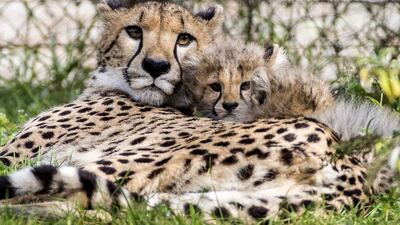India is set to release cheetahs into the wild in August, more than seven decades after they became extinct in the country.
The arrival of the 20 animals from South Africa and Namibia is set to coincide with 75 years of India's independence from the colonial rule.
Environment Minister Bhupender Yadav and Namibia’s Deputy Prime Minister and Foreign Minister Netumbo Nandi-Ndaitwah on Wednesday signed an agreement to reintroduce the extinct animal into India.
“Cheetah reintroduction in India has a larger goal of re-establishing ecological function in Indian grasslands that was lost due to extinction of Asiatic cheetah,” Mr Yadav said in a tweet.
New Delhi has for years been trying to bring the animal to the country, while facing reluctance from breeding nations.
Last year, it announced the ambitious project to bring more than a dozen African cheetahs from South Africa and Namibia to Kuno National Park in central Madhya Pradesh state.
India is expected to receive 12 cheetahs from South Africa and eight from Namibia to be released into the national park.
Mr Yadav said that the government is trying to send the wild cats to the country by August 15 to mark the country’s 75th Independence Day.
"Completing 75 glorious years of independence with restoring the fastest terrestrial flagship species, the cheetah, in India, will rekindle the ecological dynamics of the landscape," he said in a social media post.
The government has said that the main goal of reintroduction of the cheetah is to establish a viable meta-population of the wild cats in the country and to allow them to perform their functional role as a top predator.
The translocation project is managed by the National Tiger Conservation Authority as part of the Cheetah Translocation Project. It will also provide space for the expansion of the cheetah within its historical range, contributing to its global conservation efforts.
The African wild cat’s new habitat will be a vast grassland of more than 340 square kilometres. Large open spaces will allow the animals to show off their speed — they are capable of reaching 120kph.
Cheetahs globally face extinction pressure from climate change, hunting and low rates of reproduction. They are classified as vulnerable under the International Union for Conservation of Nature's red list of threatened species.
About 7,000 cheetahs remain in the wild in South Africa, Namibia, Botswana and Iran.
It is believed India had more than 10,000 cheetahs during the reign of 16th-century Mughal emperor Akbar, with about 10 per cent as hunting stock for the court.
But their population dwindled swiftly by the 1900s because of bounty hunting by British colonisers and local rulers.
The last three cats were hunted down in 1948 by Maharaja Ramanuj Pratap Singh Deo, a king in central India’s Koriya region.
In 1952, the Indian government declared cheetahs extinct in the country.
The animals would first be bred in an enclosure at the national park before being released into the wild.
The translocation project would also greatly enhance local community livelihoods through eco-tourism prospects in the long term, Mr Yadav said.


